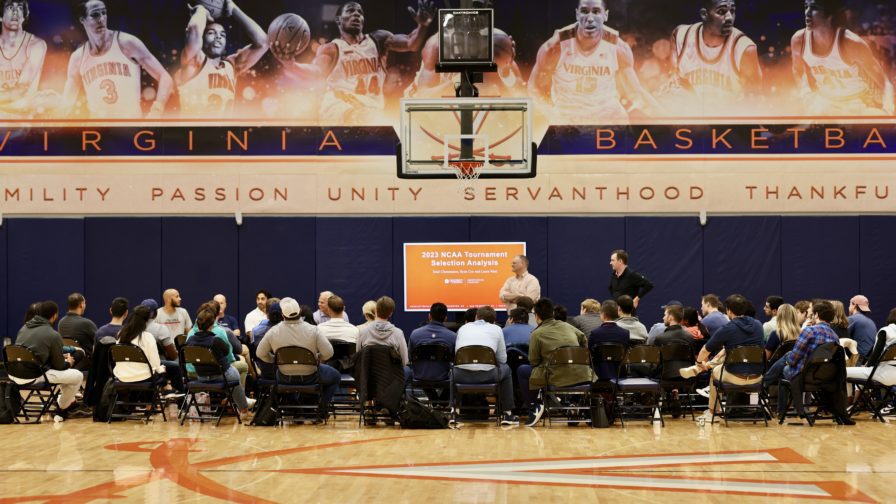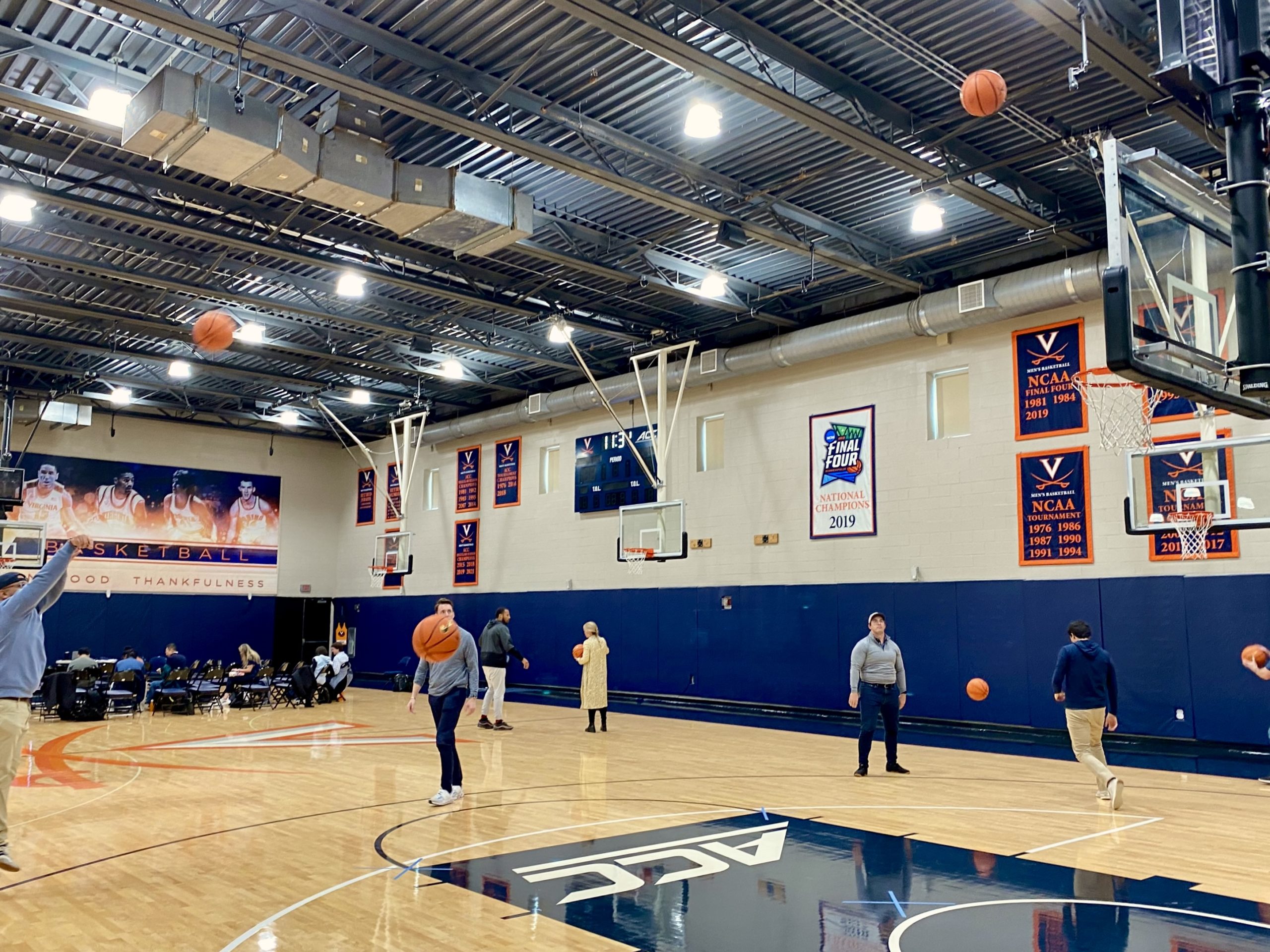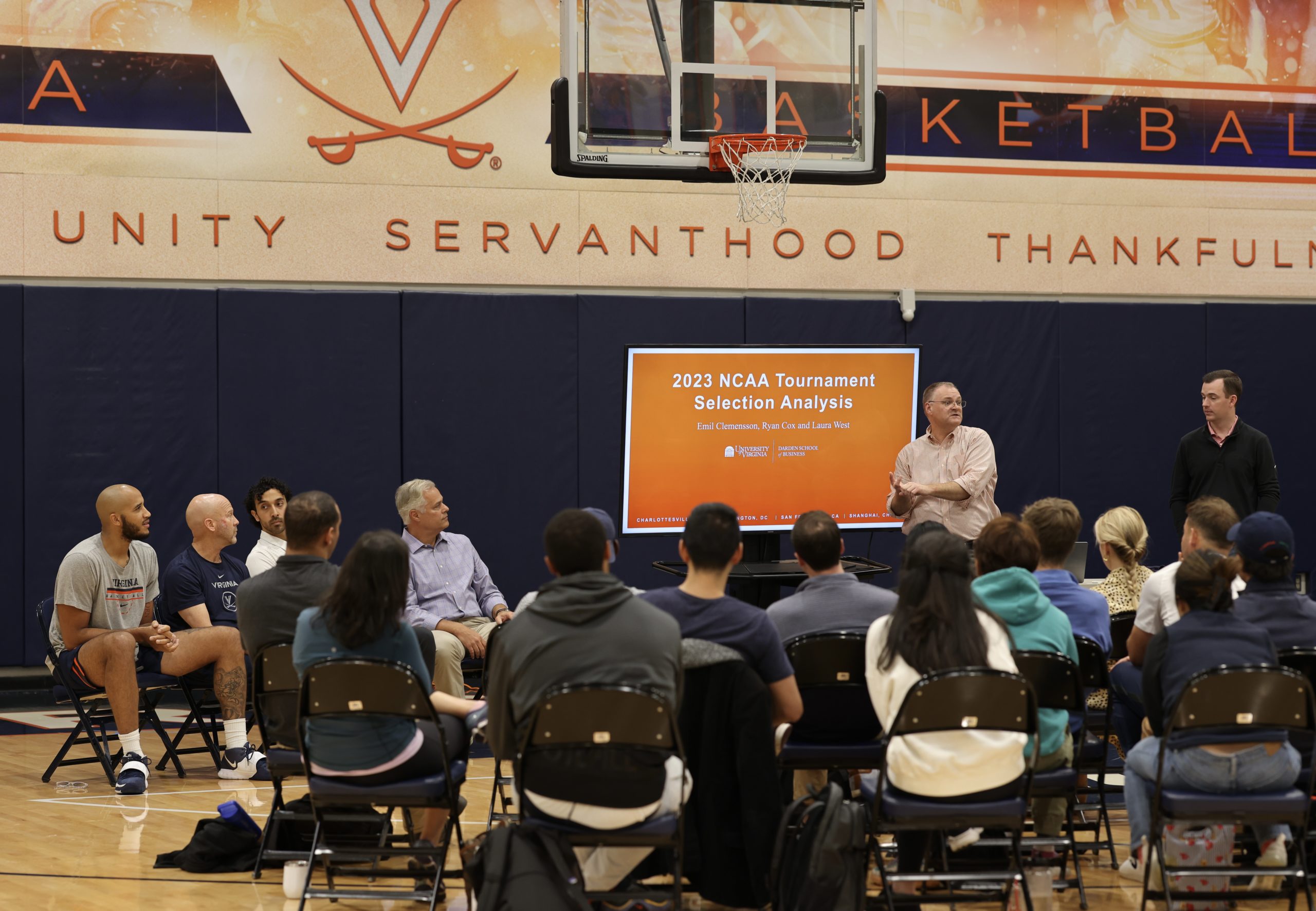
‘Selection Sunday’ Case Challenges UVA Darden Students to Make Data-Driven March Madness Picks
By Molly Mitchell
The practice court in the labyrinthine underbelly of the University of Virginia’s John Paul Jones Arena served as a classroom for Darden students taking “Data Analytics and Leadership Judgement in Sports Contexts” last month. Students put themselves in the shoes of the NCAA March Madness Selection Committee using their data and analytics skills to determine how the committee makes decisions and pitch how they might use the data differently to pick which at-large teams make the NCAA Tournament. The matter of choosing at-large teams for March Madness might strike a nerve for Hoos who had questions regarding UVA not making it into the tournament last year.
The course, taught by Darden Professor Jim Detert and Kevin Cullen, vice president of operations and technology at Monumental Sports & Entertainment, covers the ins and outs of the increasingly influential world of data analytics in college and professional sports. Students learn how leaders interpret data and use it to make decisions — or choose not to use it based on all kinds of social, psychological and other factors.
“The beauty of choosing sports as a context for analytical discussions is that the data our class works with is almost the same as the teams themselves have access to,” said Cullen. “As we discuss the power of analytics to help optimize decision making, we also note the inherent limitations in forecasting the performance of humans.”
The final session at the Cavaliers’ practice court included a presentation of findings by students and a panel discussion with UVA men’s basketball coaches Brad Soderberg, director of scouting, Johnny Carpenter (Class of 2023), director of player personnel, Isaiah Wilkins, former player and current graduate assistant, and founder of Fair Ball Foundation (and former UVA Deputy Athletics Director) Ted White. Students considered factors such as teams’ winning percentage for non-conference games, whether teams are from one of the Power 7 conferences and whether the team was ranked in key polls at specific points in the season.
“There are now immense amounts of data available in basketball — from where every player is on the court by the millisecond, to how they perform and are paid, to how what happens in all sorts of specific situations within a game, for example, whether calling a timeout stops a run by the other team,” said Detert. “The questions that can be assessed are thus almost infinite. The more interesting questions, we believe, are how individual players, coaches and other decision makers will combine the insights from analytics into an overall strategy for maximizing performance.
Ignoring all analytics is almost certainly a route to failure in sports today, but so is over-reliance on statistics. What we’re trying to do is help students understand both the art and science of data-driven decision making in sports contexts, and the related psychological and social implications of the infusion of data into sports.”
It’s one thing to form a strong opinion on how these decisions should be made from the outside, but Detert said things get complicated when you dive in. “The challenge for students was to do multiple things skillfully. To reach credible conclusions that the panel of experts would find persuasive, students had to employ their analytic toolkit appropriately and bring in their knowledge of the game to guide choices and present their results at the right level for their audience. It’s very hard to do all these things well, which is why so much analytic work that is technically correct never gets used.
The students were surprised to see how much variety there was in how different groups approached the task, how their assumptions affected their conclusions, and how the panel members themselves had differing views on the complex question they assessed.”
In addition to discussing the nitty-gritty of data analytics, the panel members offered general words of advice for Darden students on winning strategies in life.
Hard work, authenticity and surrounding yourself with people you admire were common themes, along with encouragement to continue the spirit of the class by looking at decisions from all angles.
“Don’t be afraid to think unconventionally,” said Carpenter.
The University of Virginia Darden School of Business prepares responsible global leaders through unparalleled transformational learning experiences. Darden’s graduate degree programs (MBA, MSBA and Ph.D.) and Executive Education & Lifelong Learning programs offered by the Darden School Foundation set the stage for a lifetime of career advancement and impact. Darden’s top-ranked faculty, renowned for teaching excellence, inspires and shapes modern business leadership worldwide through research, thought leadership and business publishing. Darden has Grounds in Charlottesville, Virginia, and the Washington, D.C., area and a global community that includes 18,000 alumni in 90 countries. Darden was established in 1955 at the University of Virginia, a top public university founded by Thomas Jefferson in 1819 in Charlottesville, Virginia.
Press Contact
Molly Mitchell
Senior Associate Director, Editorial and Media Relations
Darden School of Business
University of Virginia
MitchellM@darden.virginia.edu








